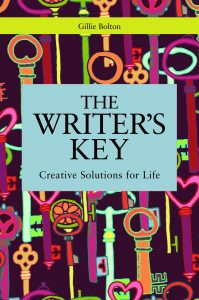Jessica Kingsley Publications
2013

The Writer’s Key is a complete guide to writing for self-reflection and personal development.
Creative writing can deepen our understanding of ourselves and our lives. This book unlocks the potential for gaining these insights, widening perspectives, finding new positivity, increasing confidence and reducing stress through writing. It:
- introduces creative writing as a very enjoyable process for enabling reflective personal and professional development
- provides strategies and inspiration for getting started, continuing despite hesitations, and getting the most out of writing
- features uplifting accounts of individuals’ successful use of the Key for self-exploration and development through creative writing
The Writer’s Key assumes no prior writing experience and will inspire and encourage anyone who wants to tell and explore their story, whether they feel trapped by issues at work or home because of loss, trauma or relationships, or simply want to make more of life.
Book review
What’s this book about?
A type of creative writing called ‘personal’ writing. Personal writing can help us cope with challenges, for example illness, other people’s behaviour, or taking a tricky decision. Personal writing does this by:
- bringing out thoughts we aren’t consciously aware of; and
- giving us a more balanced view of a situation.
This book gives lots of strategies and specialist advice on personal writing. I’d describe it as a cross between a guide and a workshop-in-a-book.
3 ideas I found compelling about this book:
- Personal writing can be self-steering. So you don’t actually know what’s going to come out when you put pen to paper. You become a creative medium.
- Personal writing can help you deal successfully with difficulties in ways that nothing else can.
- ‘Dialoguing’ (having imaginary conversations) with objects and people through various forms of writing. For example, the author asks a pair of tiger skins that appeared to her in a dream ‘why were you given to me?’ She then imagines what the tiger skins would say in response and proceeds to have a scripted conversation with them, like one from a play (see page 135).
10 things I found helpful about this book:
- I enjoyed it!
- I found the language and style accessible.
- The structure: the content is broken down into chapters which are a manageable length. There are writing exercises at the end of each chapter so you can immediately try out what you’ve just read about.
- It is very comprehensive without being vague or too detailed.
- It gives a wide range of tools for personal writing.
- It let me progress beyond the ‘gut-spewing’ type of writing to a more transformative type of writing. In other words, I now know how to use writing to change a situation rather than merely complain about it
- It is based on the author’s extensive experience of therapeutic writing, both as a writer and facilitator. This gives me confidence in it.
- It tells us that we are an excellent resource to ourselves: ‘When life becomes difficult […] the wisest person to turn to is often oneself’ (p17).
- It gives clear guidance on when to share personal writing and when to keep it strictly private.
- Writing an unsent letter to someone you’re angry with is a safe way to vent your spleen at them.
5 things that I found dyslexia-friendly about this book:
- You don’t have to read the whole book. You can dip in and read whichever chapters interest you.
- The chapter on metaphors (chapter 7) has let me understand metaphors, and why they can help me. This helps me manage my dyslexia in the context of communication.
- The author illustrates her points with examples, which makes them concrete.
- The author talks about diagrams, which are a good way for me to note ideas.
- The author quotes from a range of literature and poetry, as well as myth. This makes it a pleasure to read her book. She also quotes from writing done by her workshop participants. This gives me the message that personal writing is something anyone can do, not just classic poets!
I recommend this book to you
- whether or not you have done personal writing before.
- if you enjoy creative writing, but aren’t sure how to use it for personal development.
- if you wish to use creative writing to reconcile yourself to past or present experiences.
Glasgow Women’s Library
Buy here
ISBN: 9781849054751

